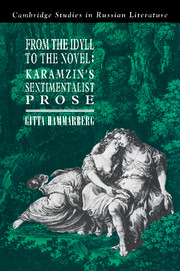Book contents
- Front Matter
- Contents
- Preface and acknowledgments
- Notes on the text
- 1 The literary and intellectual context
- 2 Theory of Sentimentalism
- 3 The literary model: the idyll
- 4 The extra-literary model: salon trifles
- 5 Serious Sentimental tales: narrator as narratee
- 6 Humorous Sentimental tales: narrator as parodist
- Notes
- Bibliography
- Index
1 - The literary and intellectual context
Published online by Cambridge University Press: 22 September 2009
- Front Matter
- Contents
- Preface and acknowledgments
- Notes on the text
- 1 The literary and intellectual context
- 2 Theory of Sentimentalism
- 3 The literary model: the idyll
- 4 The extra-literary model: salon trifles
- 5 Serious Sentimental tales: narrator as narratee
- 6 Humorous Sentimental tales: narrator as parodist
- Notes
- Bibliography
- Index
Summary
During the first half of the eighteenth century, prose fiction was not a recognized literary concern in Russia. The only kind of prose that was regulated by the ruling Neoclassicist movement was nonfictional, nonnarrative prose, such as the oration. The existing prose fiction, widely circulated in manuscript form, was, by and large, a carry-over from the seventeenth century: popular literature, tales of the ‘Frol Skobeev’ type, the so-called Petrine tales, as well as translated Western chivalric adventure tales and romances, usually referred to as prose of the ‘Bova Korolevich’ calibre. Such prose fiction was regarded by the literati as inferior mass literature, which met neither of the Horatian criteria for literature proper. It was, however, extremely popular among the masses (and, one has reason to believe, not only among the masses) and proved influential for the further development of Russian prose fiction.
Throughout the latter part of the century, this kind of prose fiction was, on the one hand, collected and published in unchanged form, and, on the other, edited, adapted, embellished, and combined with other kinds of prose and published in this changed form. The fact of publication in itself, with the widening reading public it entailed, served as an impetus for the recognition of the ‘legitimacy’ of such prose fiction. Book printing also gave a decisive boost to the Russian translators of Western prose fiction. Translation of Western novels had started on a small scale already in the 1730s in manuscript form.
- Type
- Chapter
- Information
- From the Idyll to the NovelKaramzin's Sentimentalist Prose, pp. 1 - 14Publisher: Cambridge University PressPrint publication year: 1991



